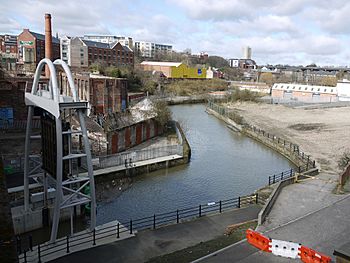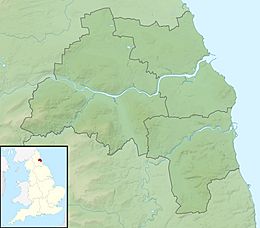Ouseburn facts for kids
Quick facts for kids Ouseburn |
|
|---|---|

Ouseburn and Barrage
|
|
|
Location of mouth within Tyne and Wear
|
|
| Country | United Kingdom |
| County | Tyne and Wear |
| Physical characteristics | |
| River mouth | River Tyne 54°58′15″N 1°35′18″W / 54.9708°N 1.5883°W |
The Ouseburn is a small but important river in Tyne and Wear, England. It flows right through the city of Newcastle upon Tyne before joining the larger River Tyne. The river is so well-known that it even gives its name to a local area called the Ouseburn electoral ward.
Contents
The Ouseburn's Journey
The Ouseburn river starts its journey in the north of Newcastle. Its source is near Callerton, close to Newcastle Airport. From there, it winds its way through several interesting places.
Flowing Through Parks and Green Spaces
The river first flows through the Kingston Park area. It then passes through Newcastle Great Park, Gosforth Park, and Whitebridge Park. These areas offer green spaces for people to enjoy.
The Ouseburn continues its path through Paddy Freeman's Park in South Gosforth. It then enters the beautiful Jesmond Dene, Armstrong Park, and Heaton Park. In these parks, the river forms the natural border between Heaton and Sandyford.
Underground and Towards the Tyne
After flowing through the parks, the Ouseburn goes underground for a bit. It travels through a culvert, which is like a large pipe or tunnel. The river then reappears from under the impressive Ouseburn railway viaduct.
From there, the Ouseburn flows past some well-known local spots. These include the City Farm, Seven Stories (a national centre for children's books), and the Toffee Factory. Finally, the Ouseburn reaches its end, where it flows into the mighty River Tyne.
The Ouseburn Barrage
For a long time, the Ouseburn river near the viaduct was affected by the tides. This meant that at low tide, dark mud would be visible along its banks. To make the area look nicer, a special structure was built.
What is a Barrage?
In 2009, a tidal barrage was built at the mouth of the Ouseburn. A barrage is like a dam that helps control the water level. Its main goal was to keep the water level high in the Ouseburn, even when the tide in the River Tyne was low. This was done to create a more pleasant environment along the riverbanks. The idea was to encourage new developments and businesses in the area.
Challenges with the Barrage
Even though a lot of money was spent to build it, the Ouseburn barrage has had some problems. It has faced operational issues. Because of these issues, the barrage was sometimes left open for periods while repairs were made.
The Ouseburn Valley Today
The lower part of the Ouseburn Valley used to be a very busy industrial area. It was filled with factories and workshops. However, things have changed a lot.
A Hub for Creativity
Today, the Ouseburn Valley is a lively and exciting place. It has become a popular spot for the arts and creative industries. Many artists, designers, and creative businesses have their studios and offices here.
The area also has a fun pub scene. It is known for its live music venues and places where you can find real ale. This makes the Ouseburn Valley a vibrant place for both work and leisure.
Hadrian's Wall Connection
Long, long ago, during Roman times, Hadrian's Wall crossed the lower Ouseburn Valley. This famous wall was built to protect the Roman Empire.
Traces of the Past
Sadly, there are no visible parts of Hadrian's Wall left to see in the Ouseburn Valley today. However, you can find a special information board on the eastern side of the valley. It is located at the end of a new block of flats. This board shows an artist's drawing of how the Wall would have looked crossing the valley.
This part of Hadrian's Wall was an extension. It was built later, stretching from the Roman fort of Pons Aelius (which is now Newcastle) to Segedunum (which is now Wallsend). This newer section of the Wall did not have the Vallum ditch behind it. The River Tyne itself acted as a natural barrier, making the ditch unnecessary.
 | Emma Amos |
 | Edward Mitchell Bannister |
 | Larry D. Alexander |
 | Ernie Barnes |


